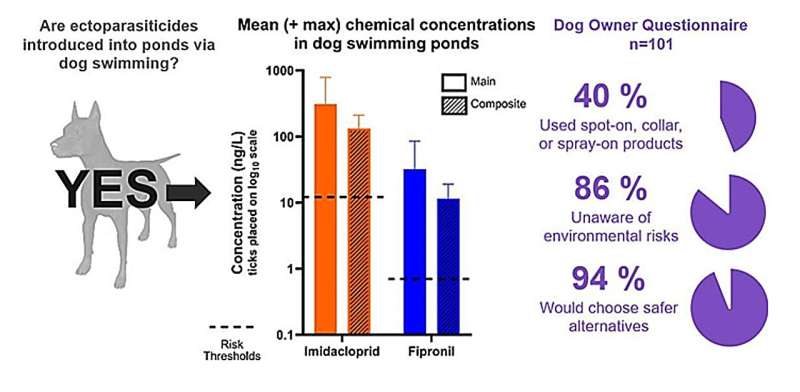A recent study has revealed that the ponds in Hampstead Heath, London, where dogs are allowed to swim, are contaminated with harmful pesticides used in pet parasite treatments. These chemicals, banned for agricultural use due to their toxicity to bees and other insects, are now threatening the delicate ecosystem of this biodiverse urban oasis. Hampstead Heath is home to many rare and threatened British species, and the contamination poses a serious risk to the invertebrate life that plays a crucial role in maintaining the health of the ponds and the wider environment.

The Alarming Impact of Pet Parasiticides on Urban Ecosystems
The study, conducted by researchers from Imperial College London, the University of Sussex, the London School of Hygiene and Tropical Medicine, and the Royal Veterinary College, in collaboration with the Heath & Hampstead Society and the City of London Corporation, has confirmed that the chemicals used in spot-on flea and tick treatments for cats and dogs are finding their way into the ponds where these pets swim.
The researchers tested three ponds where dogs are allowed to swim, three where they are not, and six connecting streams. They found that the average concentrations of the pesticides imidacloprid and fipronil in the dog-swimming ponds were more than 20 times larger than the recognized thresholds considered harmful to invertebrate wildlife. In the other ponds, no traces of these chemicals were detected, indicating that the dogs were the sole source of the contamination.
The Paradox of Protecting Pets and the Environment
The study also revealed that the majority of dog owners surveyed were unaware of the potential environmental harm caused by these parasite treatments. Furthermore, a third of the respondents were unaware that manufacturers recommend not allowing dogs to swim or be washed for a few days after the application of spot-on treatments, as the chemicals can wash off for longer than the recommended period.
Dr. Leon Barron, from the School of Public Health at Imperial, who co-led the study, emphasized the need to raise awareness among dog owners about the potential consequences of using these products preventatively. “While these chemicals are useful treatments, using them preventatively may create other serious issues such as environmental pollution and pest resistance,” he said.
Promoting Responsible Pet Care and Environmental Stewardship
The researchers suggest that pet owners should consider a ‘when needed’ approach to using parasite treatments, rather than a preventative, monthly regimen. This could help reduce the overall impact on the environment, as the chemicals would not be continuously washing off into the waterways.
Co-author Dr. Tilly Collins, from the Center for Environmental Policy at Imperial, acknowledged the benefits of dogs swimming in open spaces, but emphasized the need to find a balance: “Swimming can be very good for dogs, and bringing them to such beautiful places also encourages fitness and well-being for their owners. Stopping dogs swimming in open spaces is not the answer, but we need to reduce risk, for example, by providing more complete advice so pet owners can make informed decisions.”
